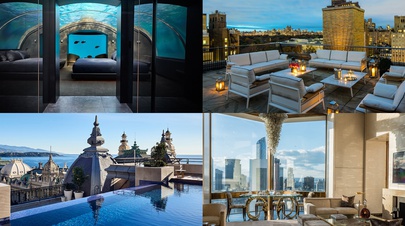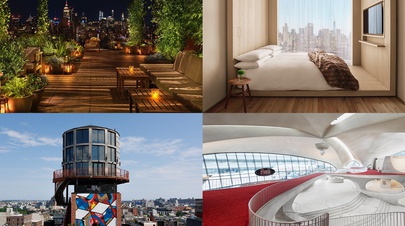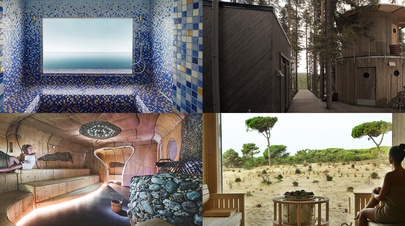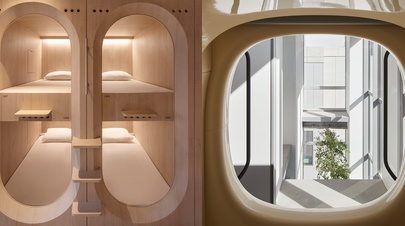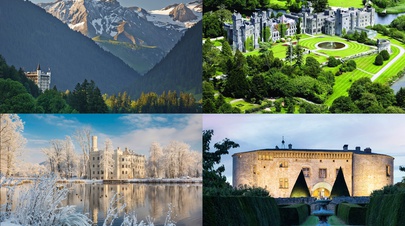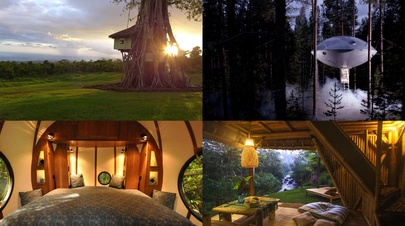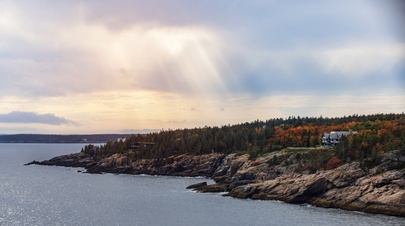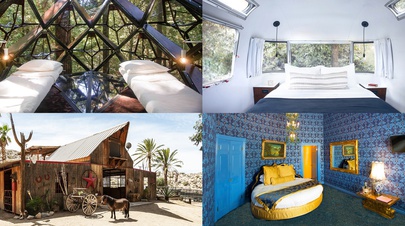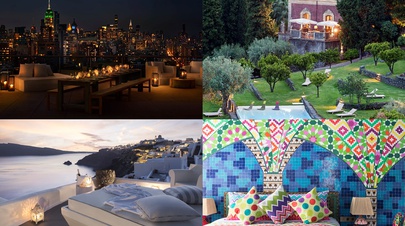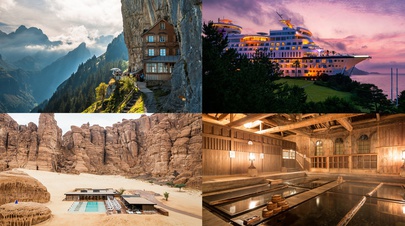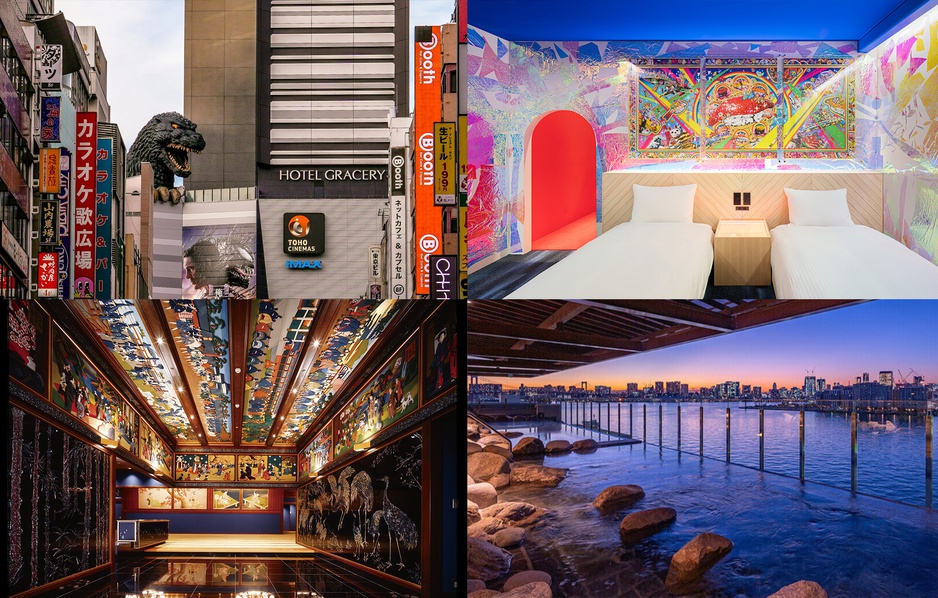
So you want to check into a hotel where dinosaur holograms hand you your room key? Sleep in a bed surrounded by 10,000 books? Wake up to find Godzilla's massive head staring through your window? Tokyo's got you covered.
The city has basically thrown the hotel rulebook out the window. Here, you can float on a canal in a boat-room painted like a Dutch canal house, soak in hot springs while gazing at the Tokyo skyline, or sleep in a capsule designed by artists convinced they've cracked the code to immortality. These places aren't just somewhere to crash after hitting the temples - they're wild experiments in what happens when creativity meets hospitality and nobody says "maybe that's too weird."
Map
BnA_WALL: Where Art Never Sleeps
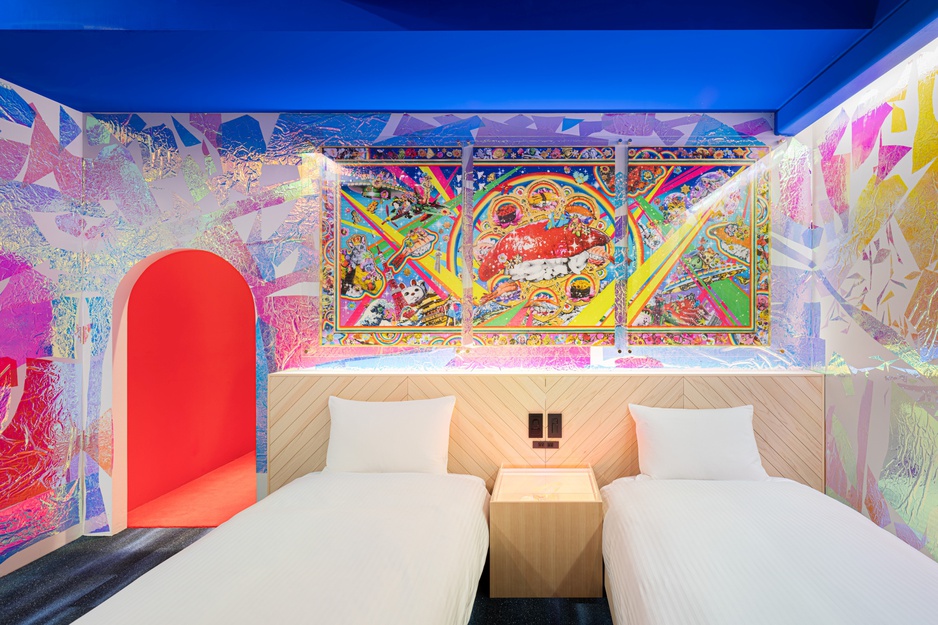
Photo by Tomooki Kengaku
This is the world's first hotel where every room is designed by a different artist, and the centerpiece mural gets repainted daily.
Located in Nihonbashi, BnA_WALL revolves around a giant mural that greets you upon entering - and here's the twist: artists repaint it every single day. If you time it right, you can watch the creation process unfold from the first-floor lounge. Each guest room is a collaboration with different artists who earn a percentage of your nightly rate, transforming spaces from floors and ceilings to furniture into immersive artworks.
The hotel also houses production and exhibition spaces, making it a living, breathing creative hub. A speakeasy-style bar connects the hotel to Tokyo's youthful art community, while the ever-changing WALL ensures no two visits are ever the same.
Hotel Gajoen Tokyo: A Museum You Can Sleep In
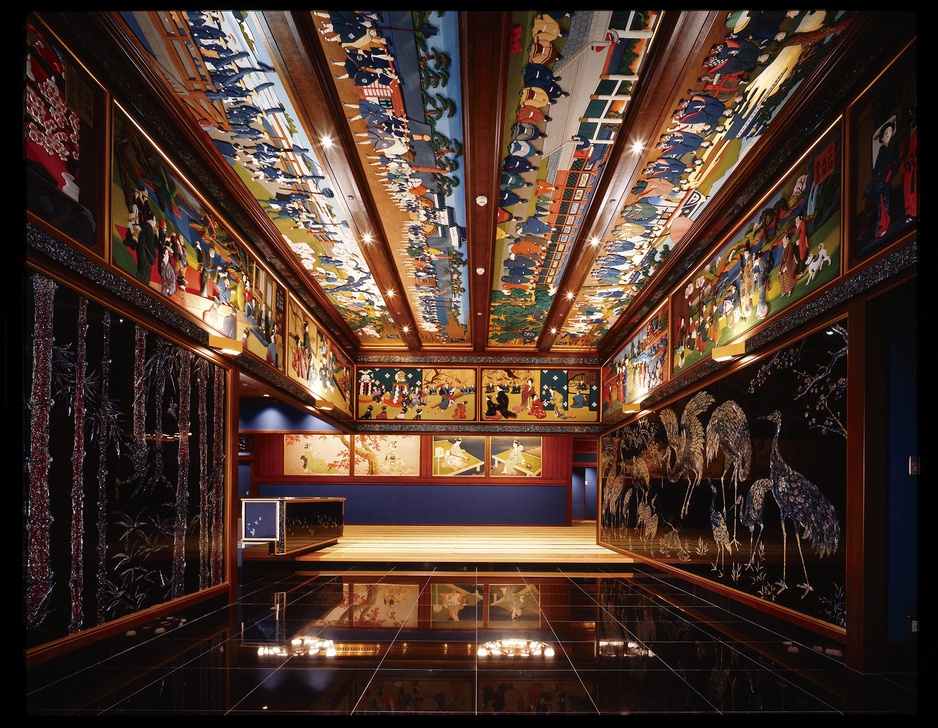
Photo by Hotel Gajoen
This historic "museum hotel" houses over 2,500 pieces of Japanese art across 90+ years of carefully preserved cultural heritage.
Originally established in 1931 as a ryōtei restaurant, Hotel Gajoen Tokyo survived both the Great Kanto Earthquake and World War II, with much of its original artwork and rooms preserved and integrated into the current structure after an 85 billion yen renovation in 1991. The hotel's crown jewel is the "Hyakudan Kaidan" (One Hundred Steps), a wooden architectural masterpiece designated as a Tokyo Metropolitan Government Tangible Cultural Property that's only open during special exhibitions.
All 60 guest rooms are modeled after traditional tea rooms, with suites larger than 80 square meters featuring saunas and whirlpool baths. The building essentially functions as a living museum where you can experience early Showa Era craftsmanship up close while enjoying modern luxury amenities.
Dormy Inn Ikebukuro: Black Water Springs in the Sky
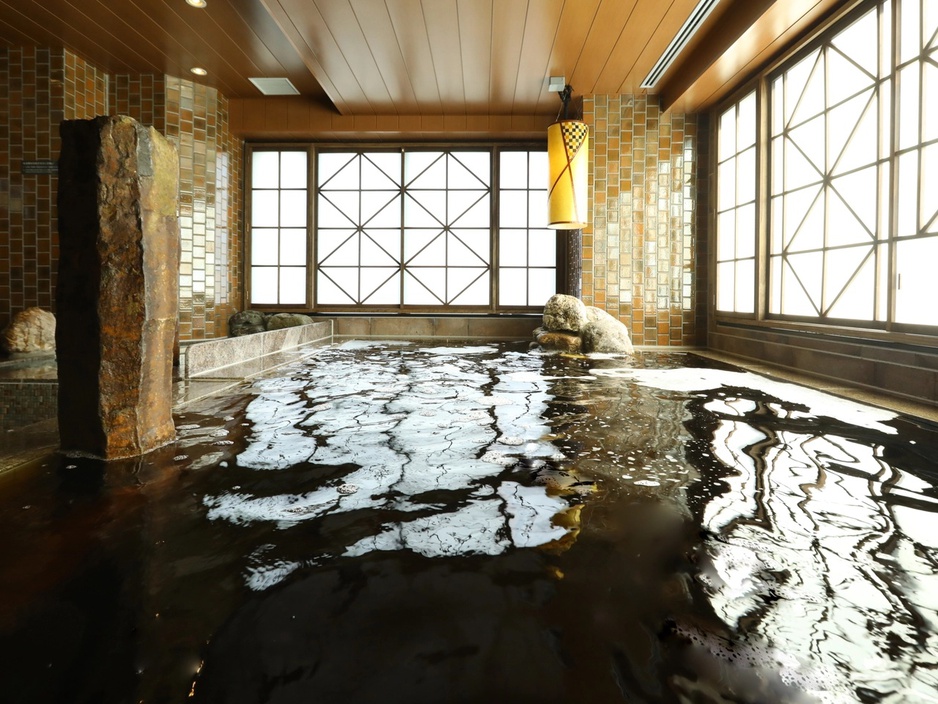
Photo by Dormy Inn
This chain hotel features the only natural "black water" hot spring in the Ikebukuro area, sourced from Chiba Prefecture and located on the 15th floor.
The rooftop spa "Hojo no Yu" brings authentic hot spring water from Sosa City via truck, creating an unexpected onsen experience high above Tokyo's urban sprawl. The open-air bath lets you stretch out under the night sky while the aromatic sauna changes scents seasonally, and a chilled water bath completes the traditional "totonou" cycle for that "incredibly pleasant sensation" sauna enthusiasts chase.
What sets Dormy Inn apart is their commitment to regional specialties - here you'll find Ikebukuro's famous "Machi Chuka" (town Chinese) cuisine for breakfast, plus their signature late-night "Yonaki Soba" service that was created in 2009 to give business travelers a communal space for serendipitous interactions. Free ice cream after your soak and morning drinkable yogurt round out the thoughtful touches.
Henn na Hotel Tokyo Asakusa Tawaramachi: Checked In by Robots
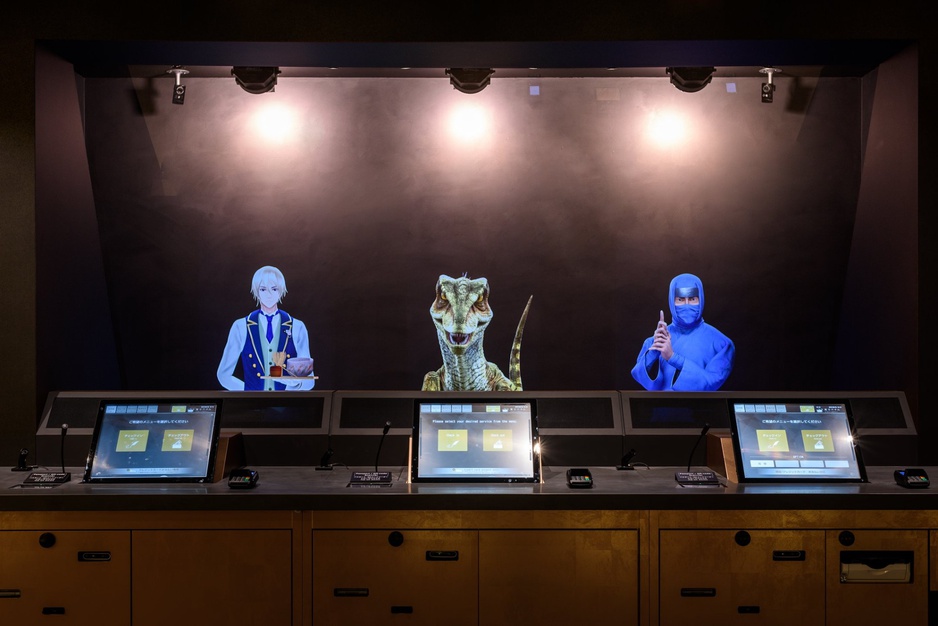
Photo by Henn na Hotel
This Guinness World Record holder for the world's first robot-staffed hotel uses light holograms featuring dinosaurs, ninjas, and anime butlers to handle check-in.
The "Express Check-in" system gives you your room key immediately, but the real show is the holographic reception where rotating characters assist with check-in and check-out procedures. Located steps from Sensoji Temple and Nakamise Street, the hotel combines cutting-edge technology with traditional Japanese elements throughout its design.
The Panda Family Suite features an extra-large stuffed panda and panda-themed everything, while Corner Suite rooms offer panoramic Tokyo Skytree views. The hotel operates under the concept of "a hotel that promises to keep changing," with over 80% of guests being international visitors drawn by both the unique tech features and prime Asakusa location.
Hotel Gracery Shinjuku: Sleep with the King of Monsters
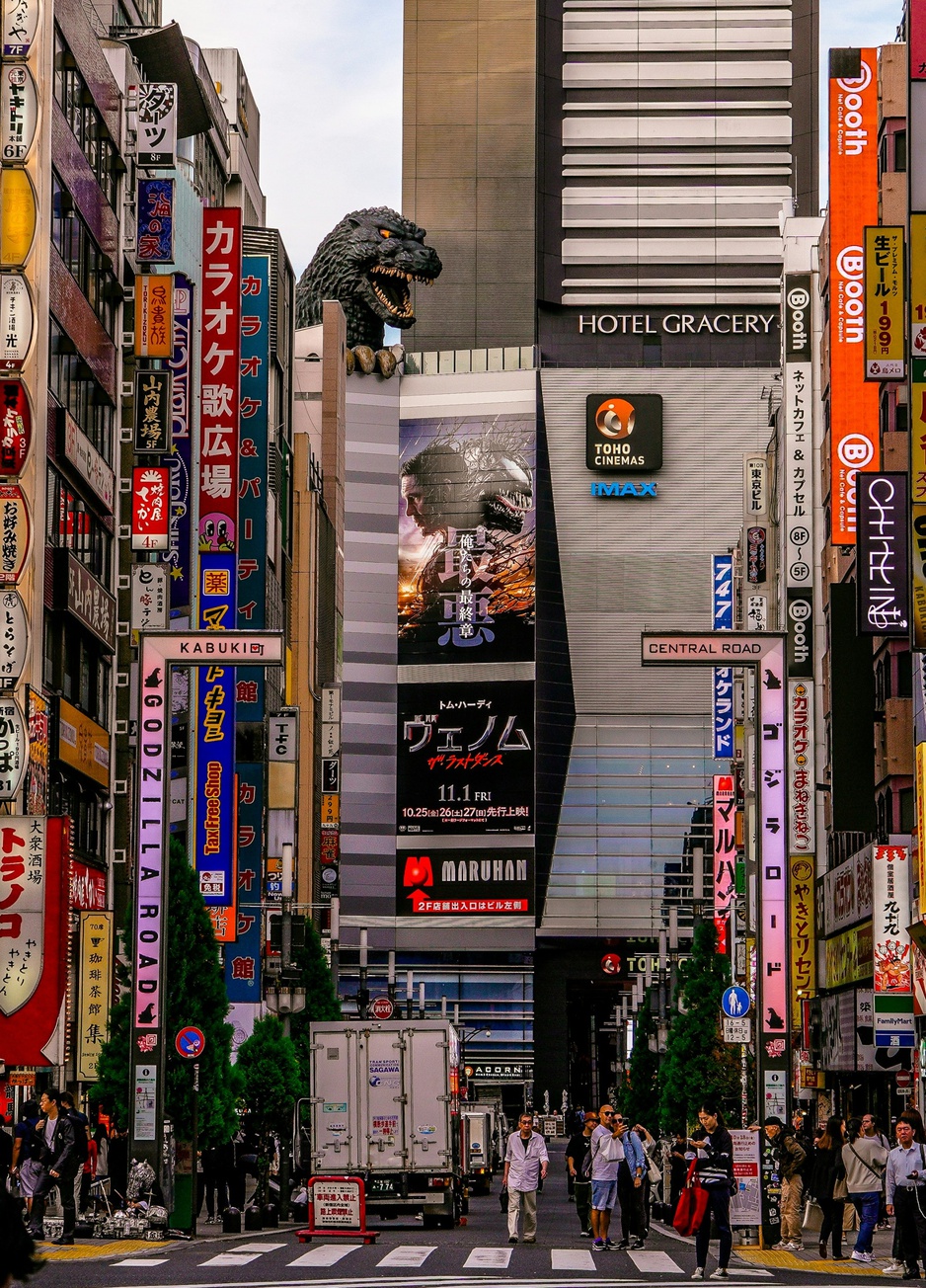
An 80-ton life-size Godzilla head looms outside your window in the special themed rooms of this 970-room hotel.
The massive Godzilla bust, based on the creature's 1992 appearance in "Godzilla vs. Mothra," was unveiled in 2015 as part of the campaign for "Shin Godzilla" and even earned the monster an official Shinjuku Tourism Ambassador title and ward residency certificate. Six "Godzilla View" rooms put you face-to-face with the beast, while the one-of-a-kind Godzilla Room features classic posters, secret blacklight decor, and a huge claw breaking through the room.
The entire 30th floor is dedicated to Godzilla, with 36 themed rooms and hallways lined with black-and-white photographs from famous movie scenes. The new "Godzilla vs. King Ghidorah Room" makes you feel like you're visiting a special effects studio, complete with realistic battle scenes unfolding in Shinjuku.
Hotel Tavinos Asakusa: Comic Strip Dreams
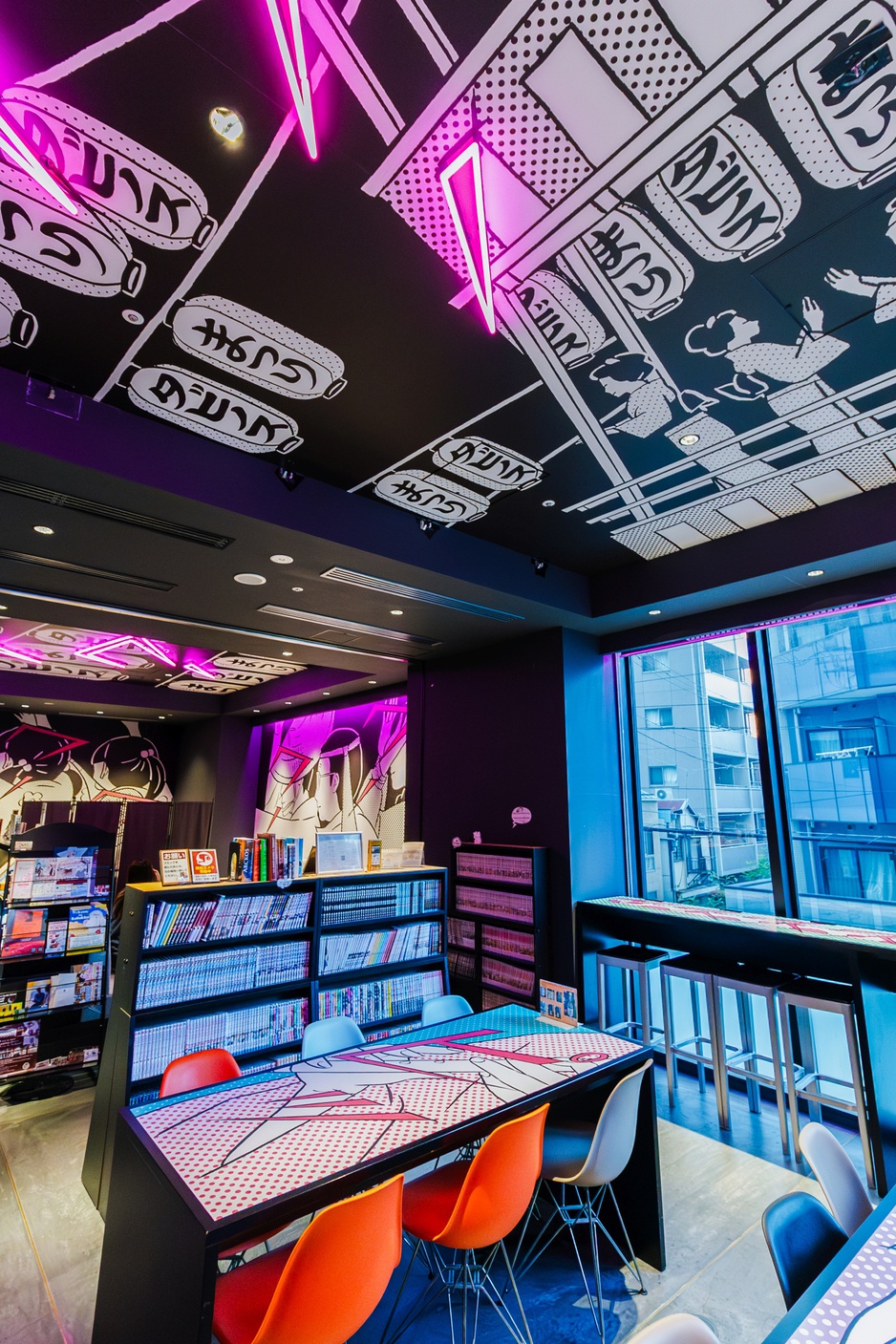
Photo by Hotel Tavinos
Every surface of this manga-themed hotel, from walls to bed linens, features comic strip motifs and vibrant illustrations designed to bring smiles to your face.
The entire hotel revolves around a festival theme, with the entrance, lobby, and hallways designed to feel like you're surrounded by festivaling crowds calling "Wasshoi, wasshoi!" Room designs incorporate festival concepts like taiyaki, cotton candy, and water balloons in bold manga-style graphics. The 12-square-meter rooms maximize space with wall-mounted hangers instead of closets and suitcase storage under raised bedding platforms.
A lounge features 10,000 comic books and comfortable seating areas that encourage guests to interact, while the automatic check-in/check-out system lets you designate your preferred room. Opened in 2020 with sustainable practices in mind, room cleaning is scheduled every three days unless you request more frequent service.
Boutique Sauna ARCH: Secret Concrete Hideaway
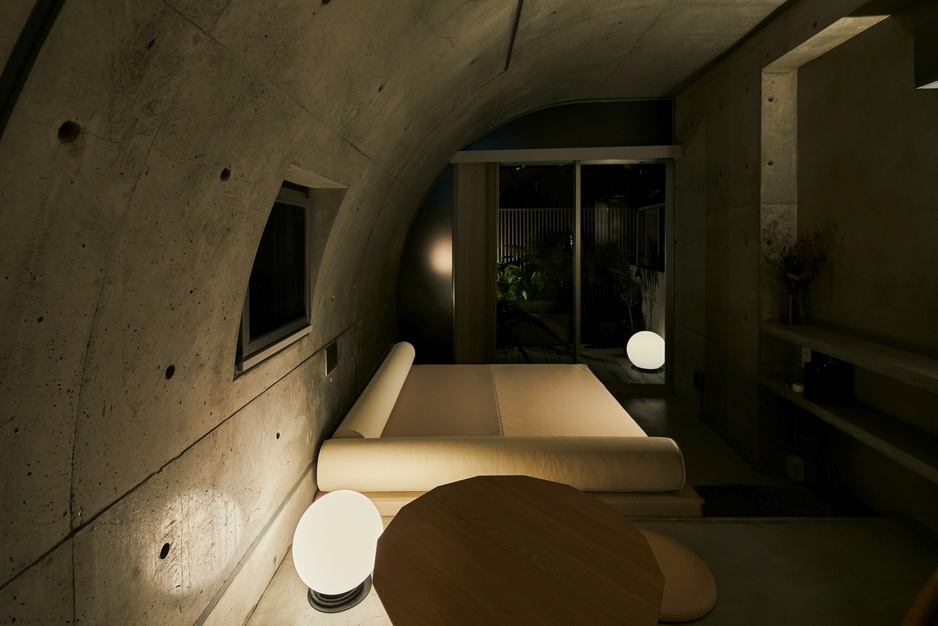
Photo by ARCH
This modern-day secret hot spring offers just two private sauna rooms perched above a mysterious bar in Kagurazaka's cobblestone streets.
Hidden on the upper floors of a stark concrete building, ARCH provides a unique three-and-a-half-hour journey that begins with warm hospitality in the downstairs izakaya, then leads you through rounds of hot sauna and ice-cold plunge pools in complete privacy. The experience includes a relaxation zone with carefully selected snacks and champagne, followed by a final spa session before the evening concludes with recommended dishes and drinks in the bar lounge starting at 9 PM.
Both spa rooms feature saunas, cold baths, and rest areas with the building's pure concrete architecture making a strong design statement both inside and out. What started as a day-use facility now offers overnight stays, making it possible to fully immerse yourself in this distinctive urban retreat.
MUJI Hotel Ginza: Minimalism Perfected
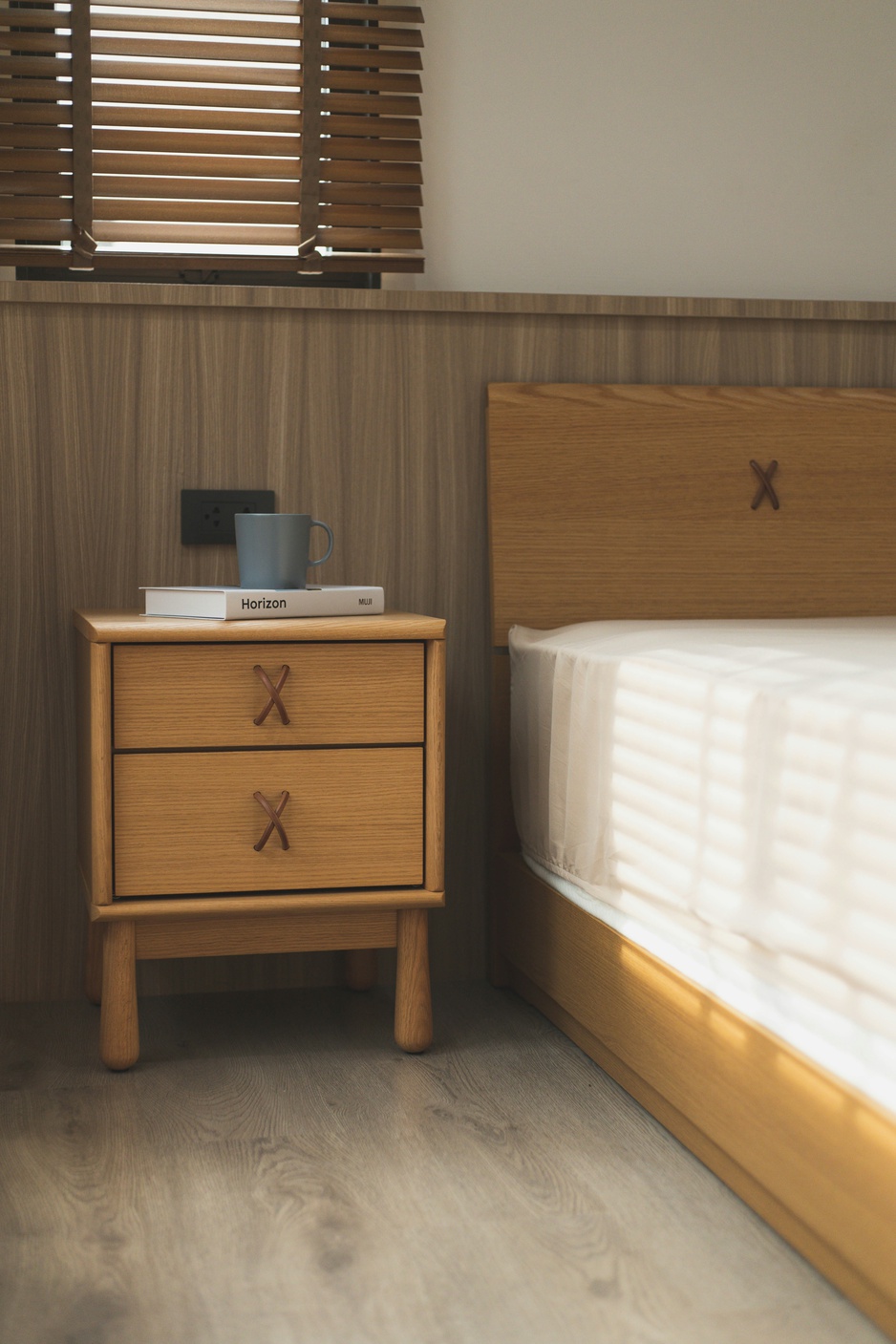
Located above MUJI's global flagship store, this hotel lets you literally live the brand's philosophy with every item in your room available for purchase downstairs.
Occupying floors 6-10 of the massive MUJI store in Ginza, the hotel's 79 rooms feature warm oak wood, white cotton sheets, and carefully considered details like soft linens and aroma diffusers that embody the brand's "Simple, Pleasant Life" ethos. Many rooms incorporate Japanese elements like tatami flooring and low-lying beds, while the standout "Re Paper Room" showcases sustainability with walls made from scrap MUJI notepad materials, artworks from cardboard, and rugs repurposed from Ginza kimono textiles.
The WA restaurant changes its menu every three months to highlight seasonal Japanese flavors, while the adjacent ATELIER MUJI GINZA features exhibitions and a bar crafted from a 400-year-old camphor tree. Hotel guests can use a discrete entrance to avoid navigating through the bustling six floors of retail below.
Petals Tokyo: Floating on Tennozu Canal
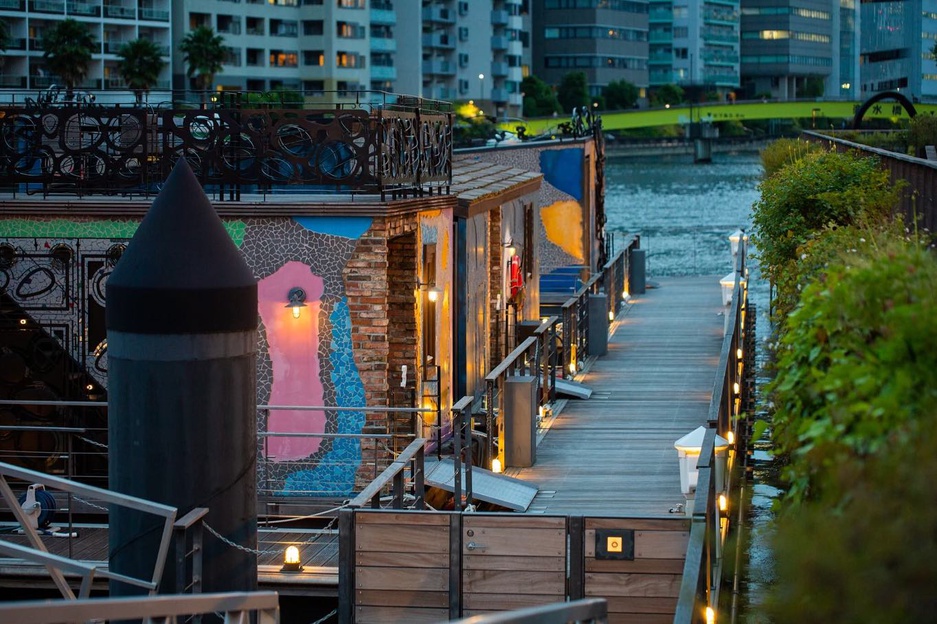
Photo by Petals Tokyo
Tokyo's only floating boutique hotel consists of four colorful vessels designed like Dutch canal houses, each offering different interior styles with spacious waterfront views.
Located on Tennozu canal near Shinagawa station, these floating "petals" sit next to architect Kengo Kuma's T-Lotus M facility, creating an artistic waterfront enclave just 20 minutes from Haneda Airport. Each vessel accommodates different group sizes, with PETAL 4 being the only three-person option, while the others house couples in uniquely designed spaces featuring everything from bold ironwork created on-site to spaceship-like shower booths that double as mist saunas.
The westward-facing rooms provide spectacular sunset views over the canal, and the sound of water creates a calming effect that makes time feel slowed down. The hotel pays extraordinary attention to eco-friendliness, using only wooden and bamboo amenities that you can take home, plus beverages in reusable packaging to protect the canal's ecosystem.
SAKE Bar Hotel ASAKUSA: Where Check-In Means Bottoms Up
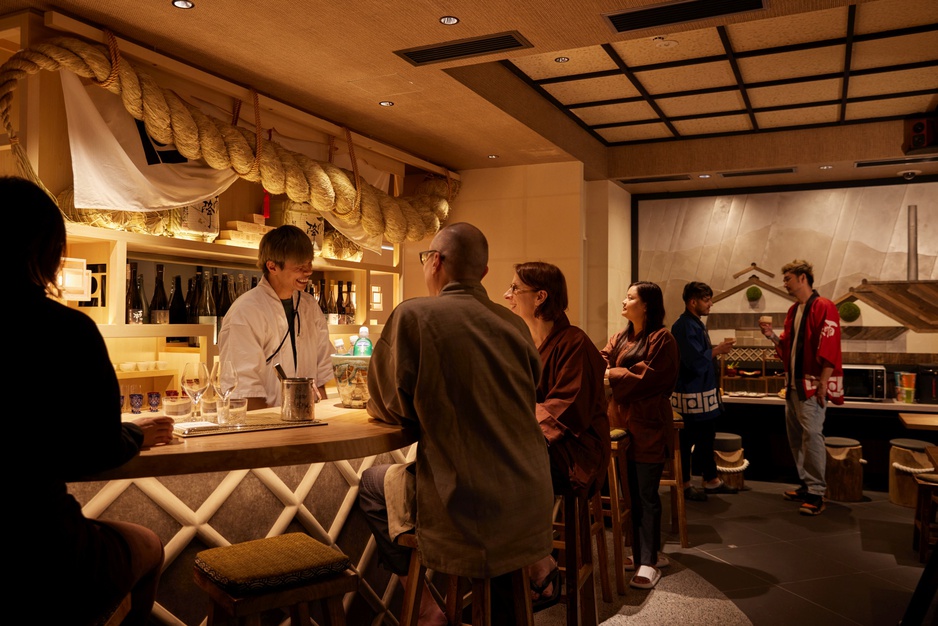
Photo by SAKE Bar Hotel
Instead of a plastic key card, you receive a traditional wooden masu cup that you can fill with unlimited sake throughout your stay at this brewery-owned hotel.
Established by the century-old Kikkawa Brewery, this 21-room property features an exclusive ground-floor sake bar designed like a Shinto shrine, complete with pebbled pathways, cedar bough balls, and a massive sacred rope hanging overhead. Between 1:30-5 PM, you can sample different sake varieties with obanzai snacks, then from 6-10 PM the space transforms into a self-service cocktail bar for sake-based experiments.
All sake comes from the brewery's Afuri series, made with pure mountain water from sacred Mount Oyama and featuring experimental touches like yeast extracted from flowers and ancient rice varieties. The hotel also offers a reservation-only rooftop private bath with sauna and cold water options, plus a 10th-floor rooftop footbath with Tokyo Skytree views where you can soak your feet while sipping sake from the automatic server.
The Tokyo Station Hotel: Century-Old Elegance Meets Modern Luxury
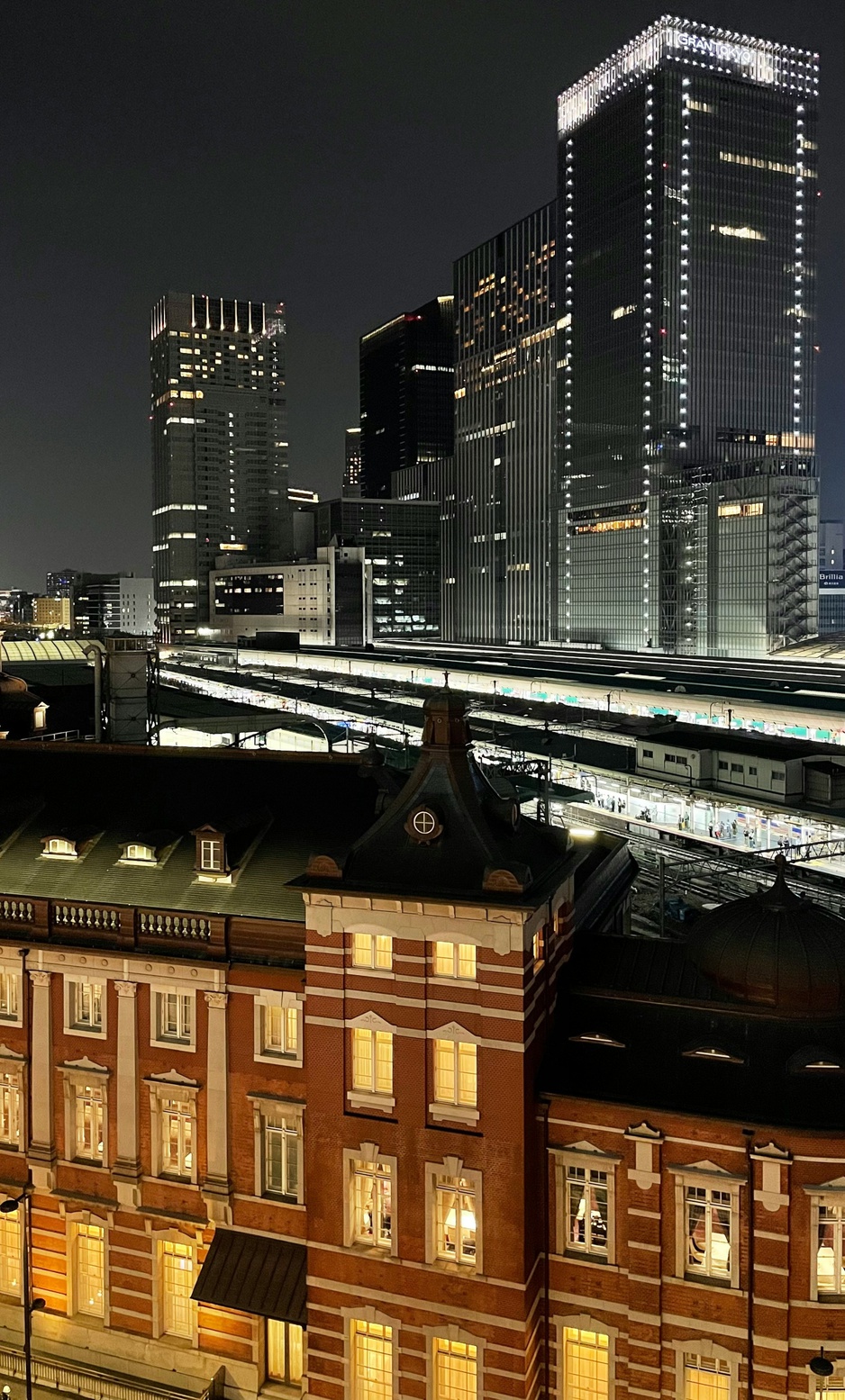
This Important Cultural Property hotel sits directly inside Tokyo Station's iconic red-brick Marunouchi building, offering a prime location at Japan's transportation gateway.
Originally opened in 1915, just one year after Tokyo Station itself, this European-style hotel has weathered earthquakes, wars, and massive renovations while hosting famous writers and prominent world figures throughout its century-plus history. The building was designated as an Important Cultural Property in 2003, and after a six-year closure for restoration, it reopened in 2012 with completely remodeled interiors in European classic style.
Unique accommodations include bi-level maisonettes and rooms positioned along the station's cupola domes, with the palatial Imperial Suite representing the pinnacle of luxury. Located directly above one of the world's busiest train stations yet maintaining remarkable tranquility inside, the hotel offers ten on-site restaurants and connects seamlessly to Japan's entire rail network, making it the ultimate base for exploring the country.
BOOK AND BED TOKYO Shinjuku: Literary Slumber
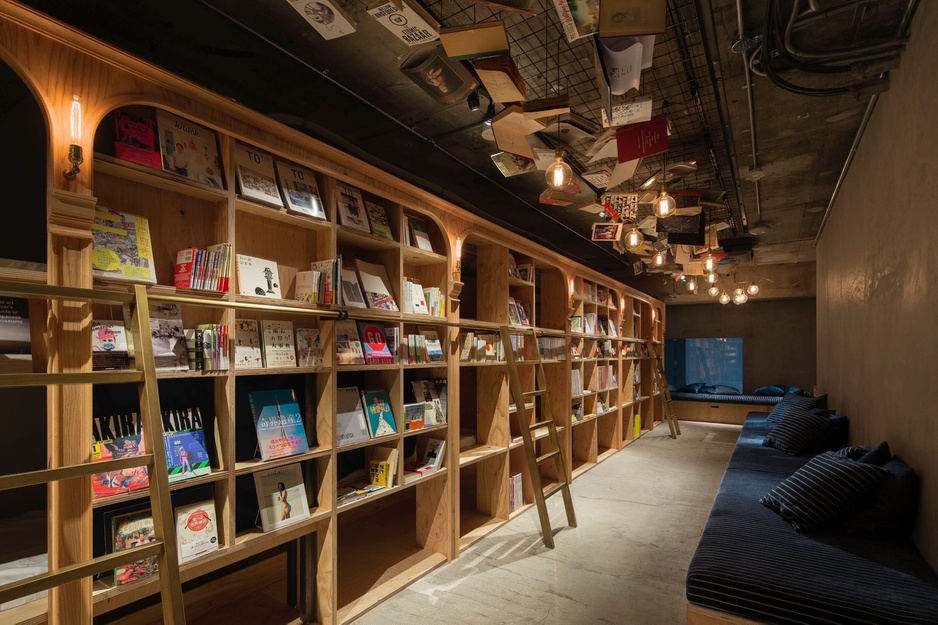
Photo by BOOK AND BED TOKYO
You literally sleep inside bookshelves surrounded by thousands of books, with beds built directly into the library stacks in this bibliophile's dream hostel.
Located on the 7th and 8th floors in Shinjuku, this book-themed hostel features a "hon-delier" (book chandelier) hanging from the ceiling and beds integrated into towering bookshelves where you can read until you drift off. The bright, sunny common area with big blue couches and 10,000 comic books creates a cozy atmosphere that attracts visitors of all ages, not just young travelers.
Unlike traditional hostels with bunk beds or capsules, here you crawl into boxes between walls lined with books, though the mattresses admittedly aren't designed for comfort - the focus is on the literary experience. The facility operates on a no-cash policy, accepting only credit cards or IC cards, and offers surprisingly decent breakfast with coffee, plus reasonably fast WiFi for updating social media about your bookish adventure.
Toggle Hotel Suidobashi TOKYO: Bold Color Therapy
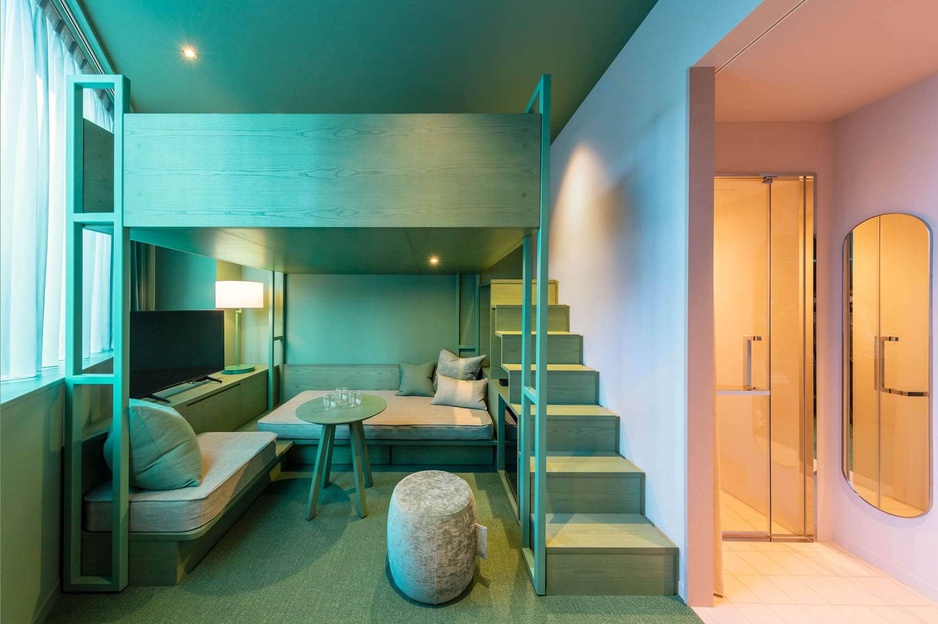
Photo by Toggle Hotel
Every room features a striking two-color palette with lofted furniture and eye-popping pastels that make Tokyo's typically small budget hotel rooms feel alive and energizing.
The yellow and black striped exterior grabs attention from passing trains, while inside you'll find a full spectrum of color combinations from avocado and millennial pink to deep sapphire and lemon yellow. Hallways are painted with different colors split down the middle, creating Instagram-worthy moments as you literally toe the line between two bold color commitments. The "toggle" concept lets you customize your experience and move between different moods, with beds lofted above couches for a particularly fun layout.
Located near Tokyo Dome in the convenient Iidabashi area, you're also close to the cobblestone streets of Kagurazaka, the former geisha district now home to some of Tokyo's best restaurants. The top-floor café and bar continues the bicolor theme with white and green zags plus dozens of potted ferns.
Reversible Destiny Lofts Mitaka: Architecture to Combat Mortality
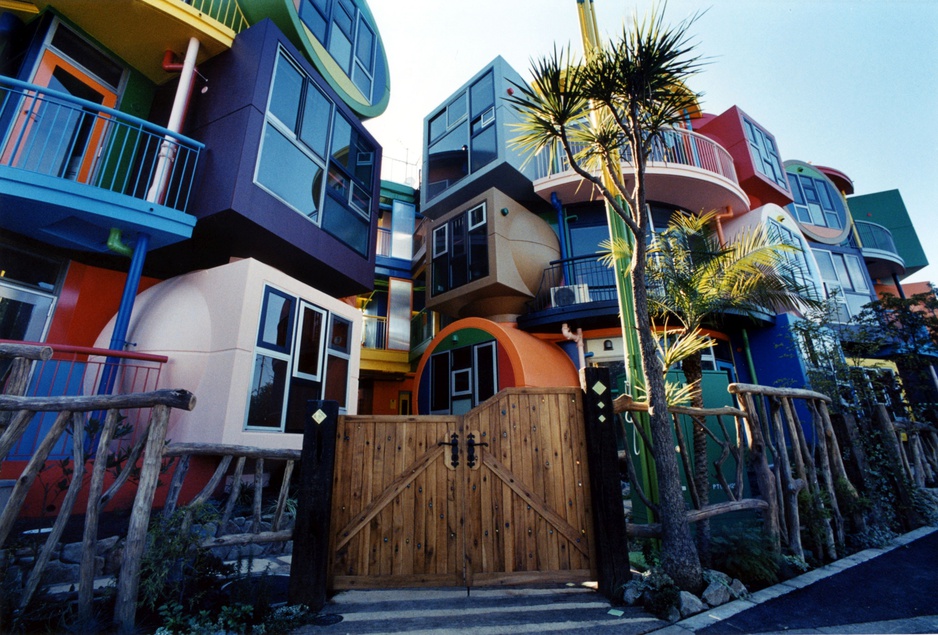
Photo by Reversible Destiny Foundation
These nine ultra-colorful units were designed by artists to be a "house to not die" - challenging your body and mind through unconventional spatial relationships.
Built in 2005 as the first residential units designed by artists Shusaku Arakawa and Madeline Gins, the building has been painted in fourteen colors both inside and outside, earning it the nickname "ultrachromatic undying house" from novelist Setouchi Jakuchou. The architecture is deliberately disorienting - there are spaces a three-year-old could navigate better than an adult, and areas where a seventy-year-old might excel, forcing you to realize you can do things you thought impossible.
Dedicated to the memory of Helen Keller, the concept embodies "reversible destiny" by creating living spaces that don't allow you to take anything for granted, constantly engaging your coordinating skills and operative tendencies. These landmark apartments in Tokyo's western suburbs continue to attract visitors from around the world who want to experience this revolutionary approach to residential space as artwork.
Tokyo Toyosu Manyo Club: Sky-High Soaking with Skytree Views
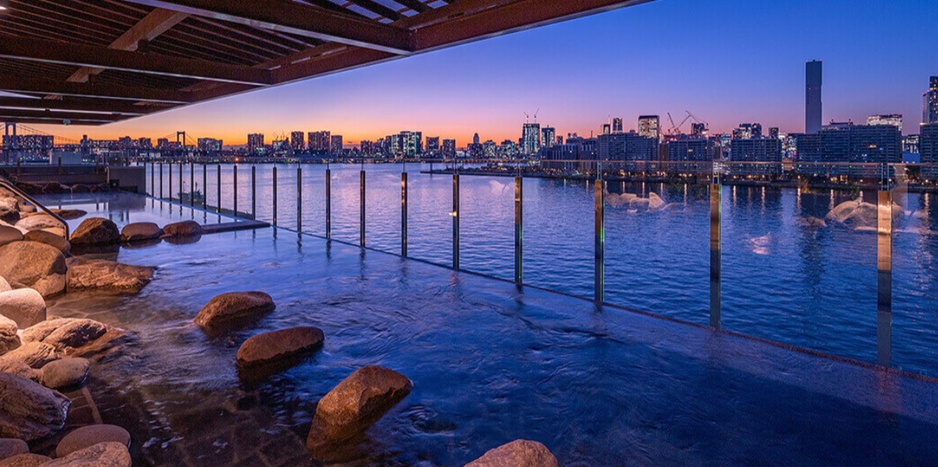
Photo by Tokyo Toyosu Manyo
This nine-floor bathing complex offers five types of hot spring baths using water trucked daily from famous Hakone and Yugawara hot springs, plus a free rooftop footbath with 360-degree city views.
Opened in February 2024 in the Toyosu area near the wholesale fish market, this 24-hour facility recreates an authentic onsen experience in the heart of Tokyo with water sourced from legendary hot spring towns. The rooftop footbath garden offers spectacular views of Tokyo Bay's dramatic day-to-night transformation, while the main bathing areas on the 6th floor include open-air baths, sleeping baths, and mist saunas.
For those seeking different experiences, the 7th floor features bedrock baths (ganbanyoku) where heated stones emit infrared rays for healing without water, plus a women-only stone sauna. The 2nd-floor relaxation room includes a reading corner with 10,000 manga volumes, while the complex also offers private onsen rooms, overnight accommodation options, and restaurants serving authentic Japanese cuisine with bay views.
9H Nine Hours Hamamatsucho Sleep Lab: Futuristic Sleep Science
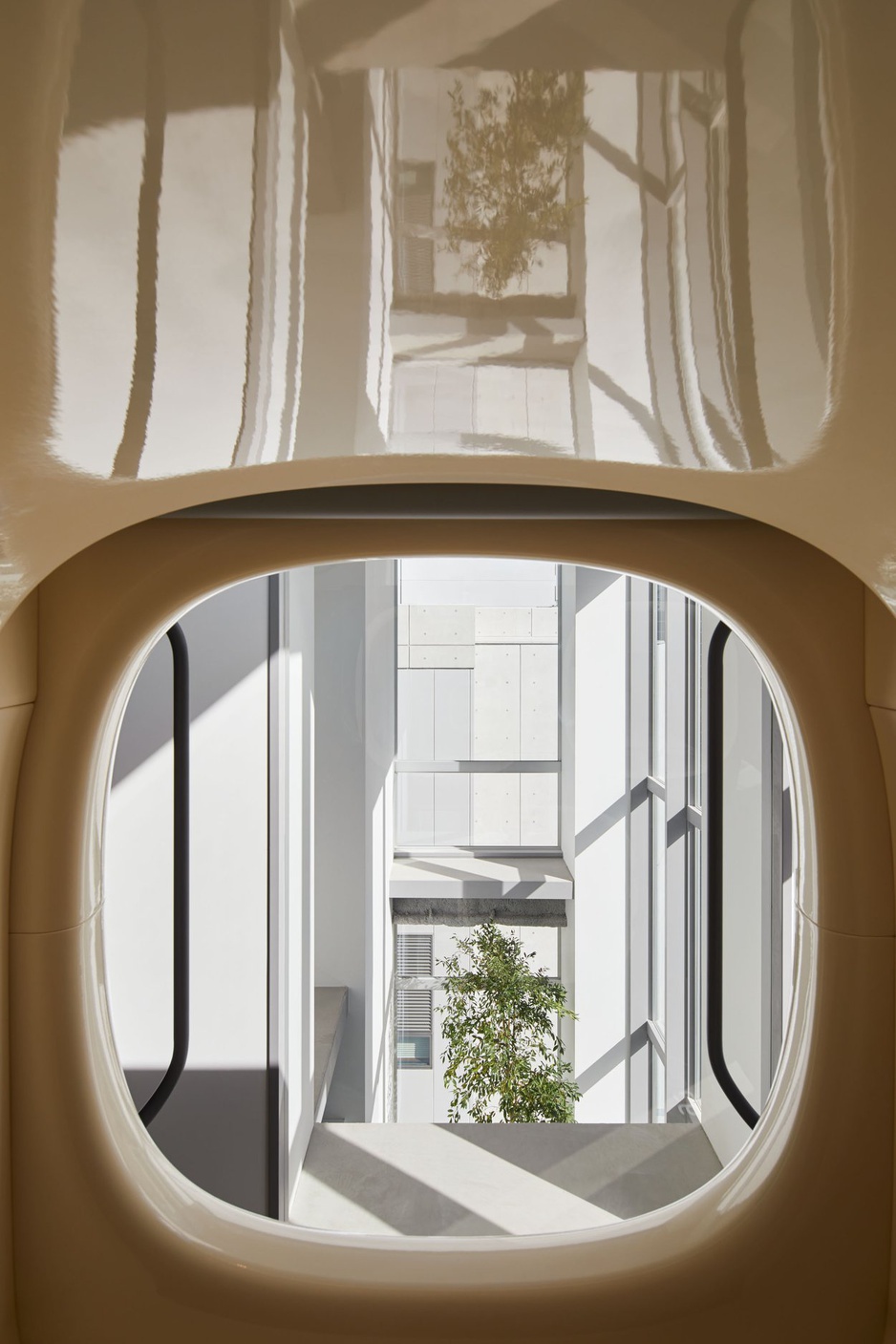
Photo by 9h nine hours
This capsule hotel reduces overnight stays to their essential elements: 1 hour to shower + 7 hours to sleep + 1 hour to dress = 9 hours total.
Located just two minutes from Hamamatsucho Station with easy access to flights and Shinkansen, the hotel strips away everything unnecessary from urban accommodation. The sleeping pods feature clean lines with electrical outlets, USB charging, dimmer controls, roller blinds, and custom mattresses developed with Nikke Shoji that balance softness and firmness perfectly. Some capsules offer sleep analysis capabilities, while the unique TOTO Warm Pillar showers provide a continuous waterfall experience with minimal splashing that mimics soaking in a bathtub.
The top floor features a 360-degree panoramic lounge and open terrace exclusively for guests, offering views of Tokyo Tower, while multiple smaller lounges throughout the building provide spaces to work or relax. Amenities include Tamanohada-brand toiletries, in-house wear, and optional breakfast sets from nearby Tully's Coffee.

